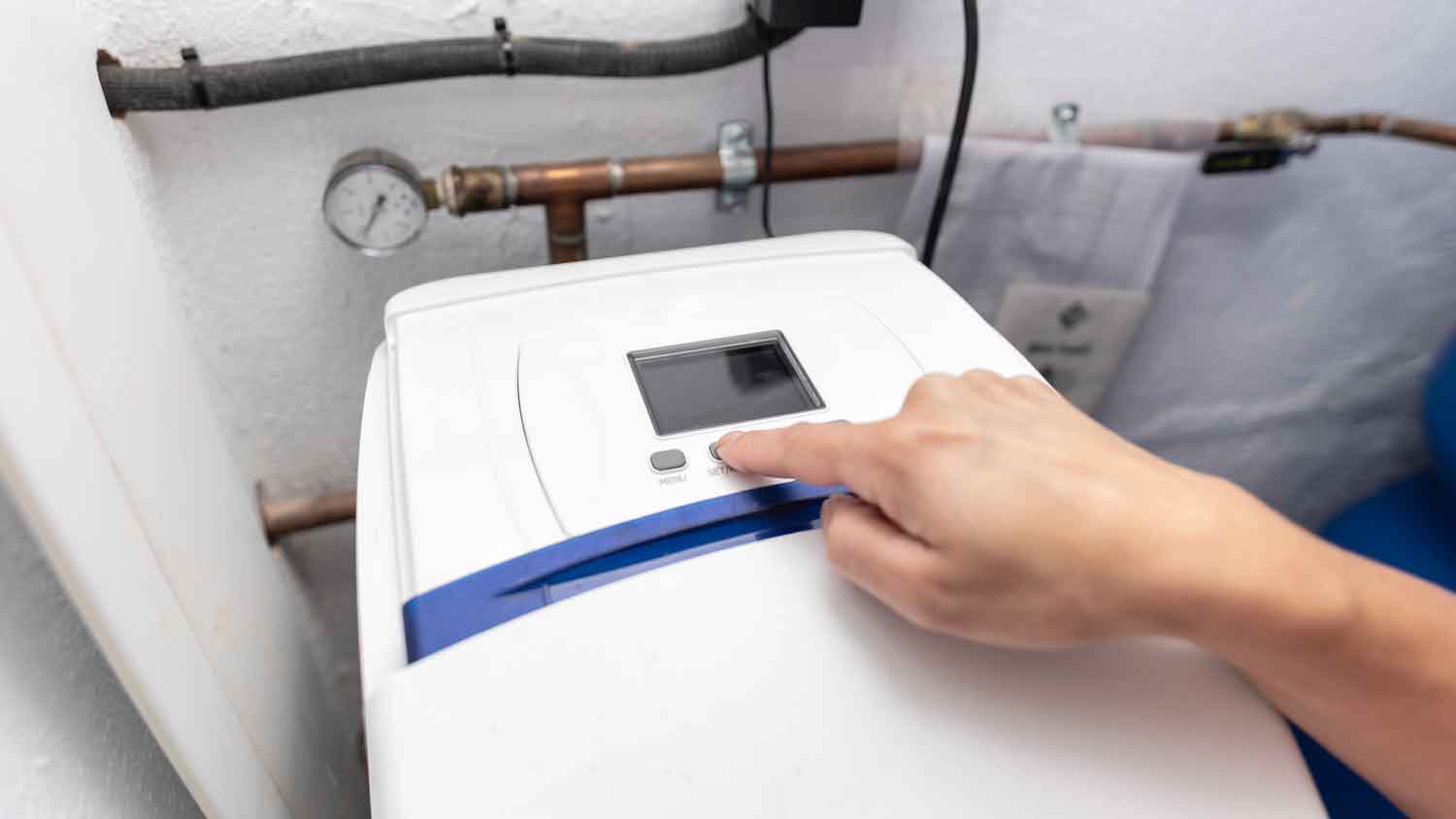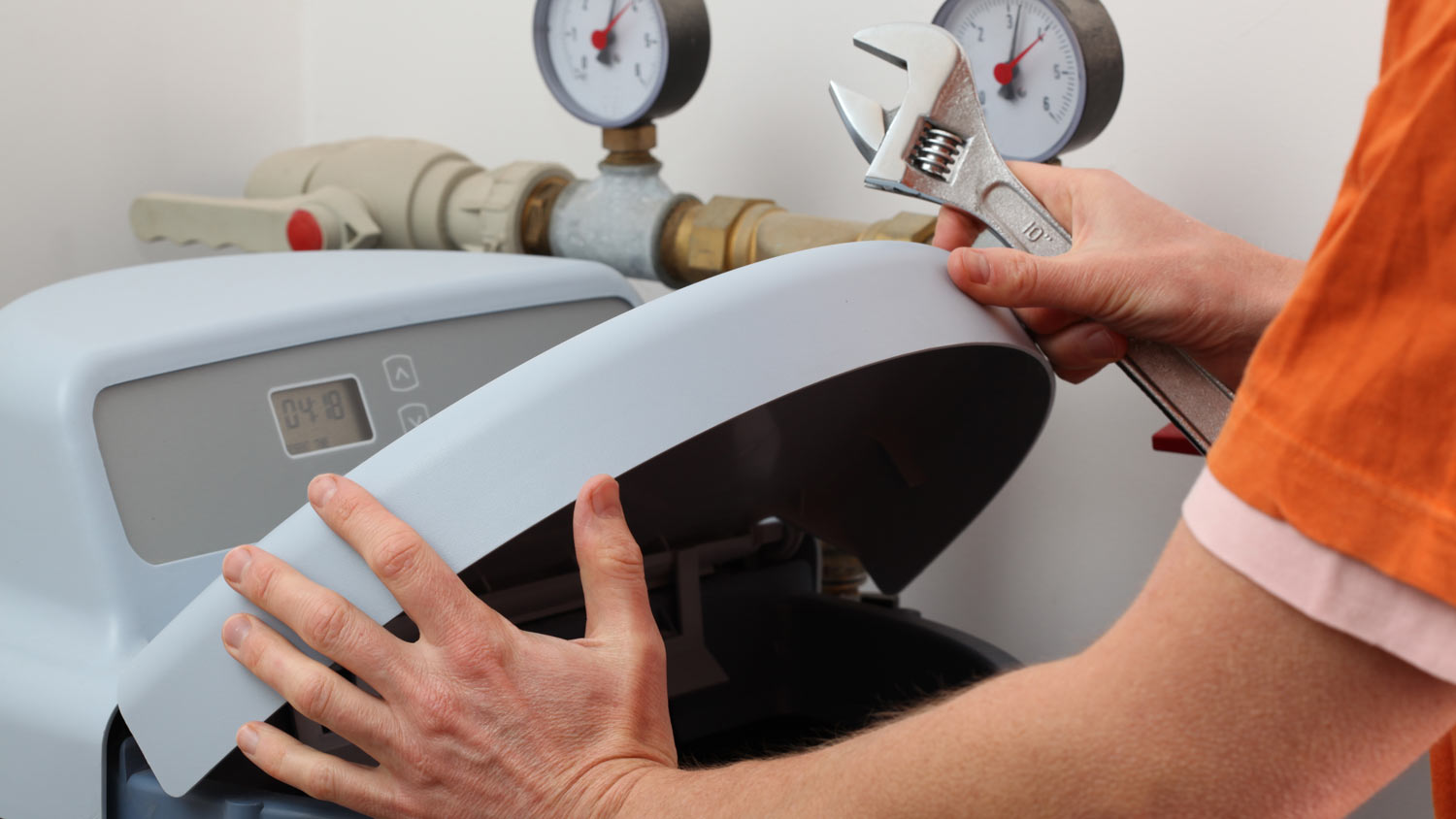
Use this guide to budget for water softener repair costs based on factors such as water treatment system type, replacement parts, professional labor, and more.
Installing a home water filtration system costs $2,274 on average, though most homeowners pay between $1,130 and $3,538, depending on the system type and number of filters your pro installs.


A home water filtration system can increase home value and ensure safe, clean drinking water.
Whole-house systems filter water as it enters the home, and point-of-use systems filter water at a certain fixture as it’s used.
System type, size, filtration rating, brand, and number of filters significantly affect the overall cost.
Additional cost factors include labor, water testing, plumbing modifications, and ongoing maintenance.
This article was created using automation technology and thoroughly fact-checked and edited by HomeAdvisor Editor Ryan Noonan.
Installing a home water filtration system costs an average of $2,274, though you could pay as little as $200 or as much as $6,000. The total cost depends on factors like system type, size, filtration rating, brand, and the number of filters. A home water filter ensures safe, clean water throughout your house. Hiring a professional can help guarantee proper installation and optimal performance.
When setting your budget for a new water filtration system in your home, you’ll need to think about a few key cost factors: the unit’s type, size, filtration rating, the brand you buy it from, and the number of filters in the system itself.
The type of water filtration system you choose significantly affects the overall cost. Whole-house water filters range from $1,129 to $3,540, averaging $2,272. Depending on system characteristics and installation requirements, options can be as low as $200 or as high as $6,000. Entry-level systems cost between $750 and $3,000, while higher-quality units range from $4,000 to $8,000 and offer improved efficiency, durability, extensive warranties, and better customer service.
| Water Filtration System Type | Average Cost |
|---|---|
| Reverse Osmosis (RO) System | $1,000–$4,800 |
| Activated Carbon Filter | $800–$1,500 |
| Ultraviolet Light Unit | $500–$1,500 |
| Well-Water Filter | $1,000–$4,000 |
| Ionization System | $1,000–$2,000 |
| Water Softener | $200–$6,000 |
| Chemical Injector | $600–$1,500 |
| Water Distiller | $1,000–$4,500 |
Most water filters are rated on their filtration abilities according to the National Sanitation Foundation (NSF), which has a few different ratings to note. These ratings tell us what kind of filters are in a given system and indicate what impurities they protect from. Filters with more comprehensive filtration (such as being certified to protect from bacteria and microorganisms) will cost more than a simpler filter that only removes chlorine.
| NSF Filtration Rating | Description |
|---|---|
| NSF/ANSI 42 | Point-of-use or whole-house systems that remove chlorine, taste, and odor |
| NSF/ANSI 53 | Filters that remove a contaminant with a ‘health effect’, such as the way carbon filters remove heavy metals |
| NSF/ANSI 44 | Water softeners that reduce water hardness caused by calcium and magnesium |
| NSF/ANSI 55 | UV light systems that reduce or eliminate bacteria and viruses from water |
| NSF/ANSI 58 | Reverse osmosis systems that reduce contaminants regulated by the EPA |
| NSF/ANSI 62 | Distillation systems that vaporize water to remove heavy metals |
| NSF/ANSI 77 | Shower filters that attach to the pipe near the showerhead to remove chlorine from the water |
| NSF/ANSI 244 | Intended for public water usage to reduce microorganisms in safe water |
| NSF/ANSI 401 | Treatment systems designed to filter ‘emerging contaminants,’ such as certain pharmaceuticals and chemicals |
| NSF P321 | Microbiological water purifiers that meet certain EPA standards |
Multi-stage filtration systems cost more based on the number of stages. Systems with more stages are generally larger and more expensive due to their complexity and the additional filtering materials required. Here are some average costs for multi-stage systems:
| Number of Filtration Stages | Average Cost |
|---|---|
| 1 | $300–$1,000 |
| 2 | $400–$1,200 |
| 3 | $500–$1,200 |
| 4 | $800–$1,200 |
| 5 | $300–$2,300 |
A few other factors will play into the final cost of installing a new home water filtration system, including the cost to hire a plumber, water testing fees, any additional plumbing you may need, and ongoing maintenance.
Labor costs for installing a water filtration system range from $300 to $500 when you hire a local plumber or water softener pro near you. This price may increase if the installation area is hard to access or if you're installing a larger, more complex system.
To ensure you install the right filter for your water supply, you'll need to test your water to identify any contaminants. Water testing costs range from $30 to $500, depending on whether you use a DIY testing kit or hire a professional for more comprehensive testing.
Sometimes, your existing pipes will need to be modified to accommodate a new water filtration system. For extra plumbing work, you can expect to pay a plumber between $45 and $200 per hour. In addition, here are some specific estimates for related tasks:
Cost to replace pipes: $150–$5,800
Cost to repair plumbing: $180–$500
Cost to replace a water main line: $650–$2,900
Cost to repipe a house: $1,500–$15,000
Cost to replace a sink: $250–$700
Cost to install a kitchen faucet: $160–$360
Cost to replace a bathroom faucet: $170–$360
Cost to install a shower: $4,150–$12,000
Cost to replace a bathtub: $2,000–$9,200
Cost to install a bidet: $40–$1,500
Cost to add a tankless water heater: $1,400–$3,900
Cost to add an outlet: $100–$450
Rewiring cost: $130–$6,200
If electrical work is required, hiring an electrician costs between $50 and $100 per hour.
Ongoing maintenance is essential to ensure your filtered water remains safe. Maintenance costs range from $50 to $300 per year and may include filter replacements and system inspections. Repair costs for a whole-house water filtration system range from $50 to $800.
A home water filtration system can increase your home's value by providing fresh, clean drinking water throughout the house. Potential buyers appreciate the assurance of safe water, and a recently installed filtration system offers peace of mind. This investment can be particularly valuable if you live in an area with known water contamination or hard water issues.
Depending on the type and size of system you choose, a new home water filtration system could be a significant expense. Here are a few ways to reduce the costs of this project:
Consult with a professional to ensure you’re choosing the right type and size of filtration system for your needs.
Invest in a comprehensive water test to ensure you’re protected from all necessary contaminants (and not wasting money filtering contaminants that aren’t in the water).
Invest in an energy-efficient filtration system to reduce ongoing costs.
Look into rebates or other incentives in your municipality for filtering water or choosing energy-efficient units.
No place is more important than your home, which is why HomeAdvisor connects homeowners with local pros to transform their houses into homes they love. To help homeowners prepare for their next project, HomeAdvisor provides readers with accurate cost data and follows strict editorial guidelines. We surveyed thousands of real customers about their project costs to develop the pricing data you see, so you can make the best decisions for you and your home. We pair this data with research from reputable sources, including the U.S. Bureau of Labor Statistics, academic journals, market studies, and interviews with industry experts—all to ensure our prices reflect real-world projects.
From average costs to expert advice, get all the answers you need to get your job done.

Use this guide to budget for water softener repair costs based on factors such as water treatment system type, replacement parts, professional labor, and more.

Find out who repairs water softeners and who to call—water softener companies or plumbers—and learn what to expect before you book

Who installs water softeners? Learn whether to call a plumber or technician, how pros get it done, and what installation costs

If you’re planning to install a water softener, consider budgeting based on capacity, type of system, tank size, and more.

Budget for reverse osmosis water filter costs based on factors such as system type, efficiency, number of stages, labor, add-on features, and more.